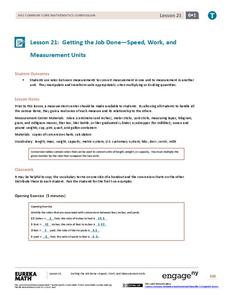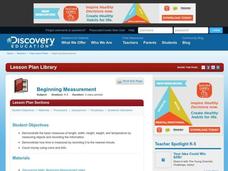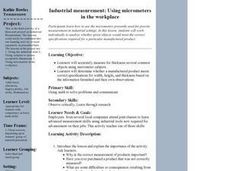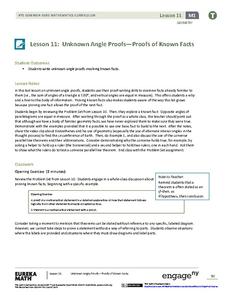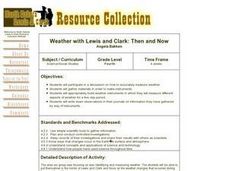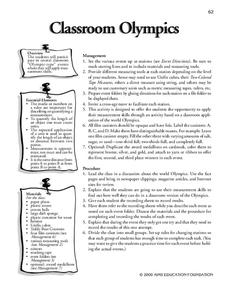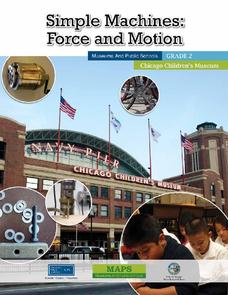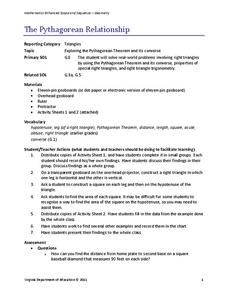Curated OER
It's All in the Measurements
Study customary measurements with your sixth graders. They will investigate linear and capacity measurements to then measure and convert linear and capacity units. Finally they will work in small groups to conduct experiments. Resources...
Virginia Commonwealth University
General Construction Measurement and Dimensions
Learners construct their understanding of measurement and dimensions in this step-by-step approach that begins with an all group vocabulary introduction, consisting of measuring objects and dialoging using measurement vocabulary....
EngageNY
Getting the Job Done—Speed, Work, and Measurement Units
How do you convert from one measurement to another? Pupils use unit rates to convert measurements from one unit to another in the 21st segment in a 29-part series. They convert within the same system to solve length, capacity,...
Curated OER
Discovering Math: Beginning Measurement
Young mathematicians are shown a ruler, yardstick, tape measure and scale. They practice measuring length, width, height, and weight. They are then shown a thermometer, and discuss what a thermometer is used for. Everyone is shown how to...
Discovery Education
By the Foot: The History of Measurement
When is a foot not a foot? When you use the length of your own foot to measure distances, of course. To underscore the importance of standardized units of measurement, middle schoolers engage in a series of activities that ask them to...
Curated OER
Discovering Pi/Welcome to Pi Day
Students explore pi. In this circle measurement lesson, students define and identify radius, diameter, circumference, and perimeter. Students work in groups to measure several plastic lids and record their findings. Students compare the...
Curated OER
My Foot and the Standard Foot
Young mathematicians put one foot in front of the other as they learn how to measure length in an elementary math lesson. Using paper cutouts of their own feet, children measure classroom objects as they discover the importance of...
Curated OER
Fun With Adhesives
Students observe, measure, and record the properties in making objects stick together using science tools. In this science lesson, students explore with their senses while mixing flour and water. Additionally, students share their...
DiscoverE
LIDAR: Mapping with Lasers
We would be lost without maps! How are they made? Introduce junior topographers to LIDAR technology with a fascinating activity. Set up a mock city, then have learners operate a laser measure to determine the shape of the landscape using...
PBS
Frame Yourself: Area and Perimeter
Elementary schoolers are arranged in pairs and view the video Math Works: Measurement: The Difference Between Perimeter and Area. They discuss any prior knowledge they have of the term perimeter and then brainstorm together what the...
Curated OER
Industrial Measurement: Using Micrometers in the Workplace
Students accurately measure several common objects for thickness using micrometer calipers. They work individually to analyze whether given objects would meet the correct specifications required for a particular manufactured product.
EngageNY
Unknown Angle Proofs—Proofs of Known Facts
Lead the class in a Greek history lesson with a geometric twist. Pupils relate a short video about geometric properties to modern-day methods of solving for unknown angles. They discuss parallel line theorems and complete...
Laboratory for Atmospheric and Space Physics
Charting the Progress of New Horizons
In 2006, New Horizons began its mission to fly to Pluto. As it continues its journey, scholars track its progress with the help of an informative website, all the while reinforcing measurement concepts with the construction of a scaled...
Curated OER
Dr. Dirt's Archaeology Lab Artifact Analysis
Young scholars simulate analyzing artifacts in archaeological lab by using real techniques that archaeologists use. Students practice measuring skills, drawing, writing, and brainstorming, and make inferences based on evidence.
Curated OER
The Changing Me
Third graders study the human body. In this health lesson, 3rd graders discuss that everyone's body is growing, measure body parts using a tape measure, and color the body worksheet.
EngageNY
Fundamental Theorem of Similarity (FTS)
How do dilated line segments relate? Lead the class in an activity to determine the relationship between line segments and their dilated images. In the fourth section in a unit of 16, pupils discover the dilated line...
Chicago Botanic Garden
Historical Climate Cycles
What better way to make predictions about future weather and climate patterns than with actual climate data from the past? Young climatologists analyze data from 400,000 to 10,000 years ago to determine if climate has changed over...
Curated OER
Length, Weight and Measures
Students complete measurement activities. In this measurement lesson, students watch online clips about measurements. Students view items and discuss taking measurements of them. Students discuss what units of measurement and equipment...
Curated OER
Weather with Lewis and Clark: Then and Now
Fourth graders discuss how to accurately measure weather, gather materials in order to make instruments, and build weather instruments in which they measure and record different aspects of weather for a five-day period.
AIMS Education Foundation
Classroom Olympics
As the Summer Olympics are approaching, incorporate Olympic-type games into the classroom. From straw javelin to cotton ball shot put, these games are sure to keep leaners engaged. The best part is that there is math involved! Pupils...
Chicago Botanic Garden
Albedo, Reflectivity, and Absorption
What is reflectivity, and what does it have to do with the Earth's climate? As reflectivity is measured by albedo, scientists can gather information on Earth's energy balances that relate to global warming or climate change. Budding...
Chicago Children's Museum
Simple Machines: Force and Motion
Get things moving with this elementary science unit on simple machines. Through a series of nine lessons including teacher demonstrations, hands-on activities, and science experiments, young scientists learn about forces, motion,...
Virginia Department of Education
The Pythagorean Relationship
Add up areas of squares to discover the pythagorean relationship. Small groups create right triangles with squares along each side. They calculate the areas of each square and notice the relationship. Groups construct other types of...
BBC
The Role of a Monarch (key stage 2 and 3)
What makes a good monarch? Elementary and middle schoolers examine popular symbols of the British monarchy before designing a television advertisement about the qualities needed in a monarch. Next, they write poems using metaphors and...


